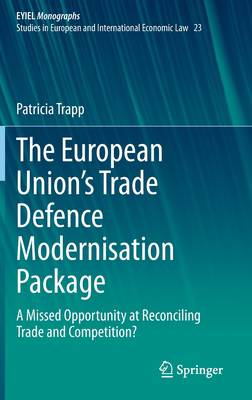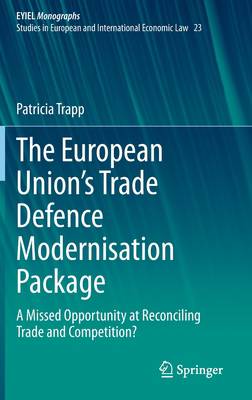
- Retrait gratuit dans votre magasin Club
- 7.000.000 titres dans notre catalogue
- Payer en toute sécurité
- Toujours un magasin près de chez vous
- Retrait gratuit dans votre magasin Club
- 7.000.0000 titres dans notre catalogue
- Payer en toute sécurité
- Toujours un magasin près de chez vous
The European Union's Trade Defence Modernisation Package
A Missed Opportunity at Reconciling Trade and Competition?
Patricia Trapp
Livre relié | Anglais | European Yearbook of International Economic Law | EYIEL Monographs - Studies in European and International Economic Law | n° 23
147,95 €
+ 295 points
Format
Description
Anti-dumping and anti-subsidy measures are the most important elements of the European Union's trade defence instruments. Since the beginning of the European integration process, they have been used to combat trade practices which are considered "unfair" and their distortive effects on competition in the internal market. However, while the imposition of trade defence measures aims to level the playing field between EU producers and their foreign competitors, it also produces negative effects on competition itself.Based on the role attributed to competition and trade defence policy respectively throughout the European integration process, this book argues that the trading bloc's trade defence instruments should not be designed or applied with the objective of granting maximum protection to EU producers, but that their use should be limited to what is necessary to ensure fairness in competition between EU producers and exporting producers.However, an analysis of the changesmade to the European Union's Basic Anti-Dumping Regulation and the Basic Anti-Subsidy Regulation by the Trade Defence Modernisation Package reveals that several aspects of the European Union's modernised trade defence instruments do not meet this requirement. Rather than being limited to offsetting the unfair competitive advantages of producers practicing dumping or benefiting from subsidies, the reformed provisions go beyond this, distorting competition in favour of the EU industry instead. Furthermore, the book critically assesses the reformed rules relating to the integration of social and environmental aspects in the imposition of anti-dumping or anti-subsidy measures as well as the modernised basic regulations' compatibility with WTO law.
Spécifications
Parties prenantes
- Auteur(s) :
- Editeur:
Contenu
- Nombre de pages :
- 332
- Langue:
- Anglais
- Collection :
- Tome:
- n° 23
Caractéristiques
- EAN:
- 9783030913625
- Date de parution :
- 05-01-22
- Format:
- Livre relié
- Format numérique:
- Genaaid
- Dimensions :
- 156 mm x 234 mm
- Poids :
- 666 g

Les avis
Nous publions uniquement les avis qui respectent les conditions requises. Consultez nos conditions pour les avis.






